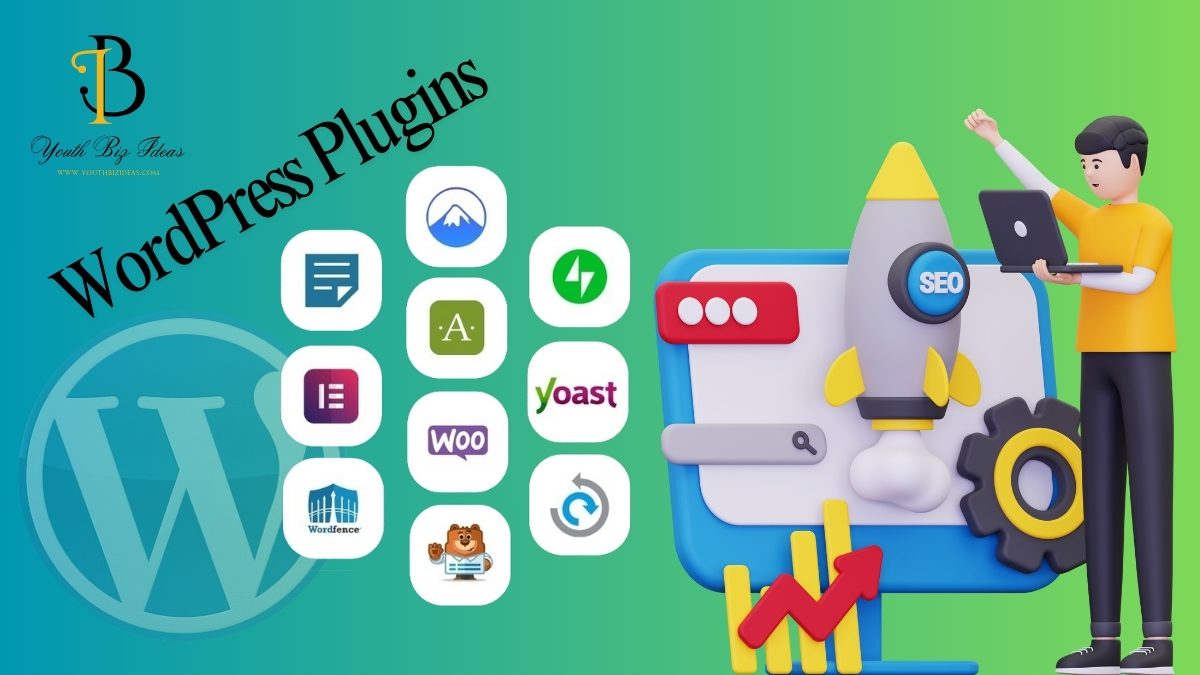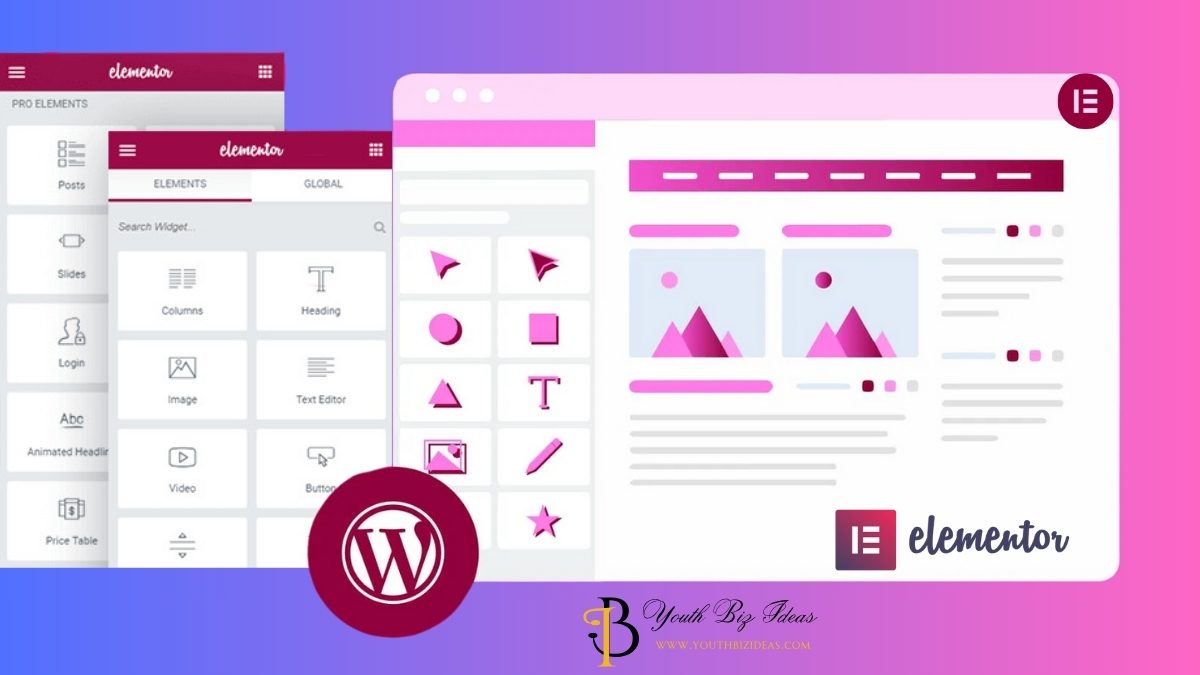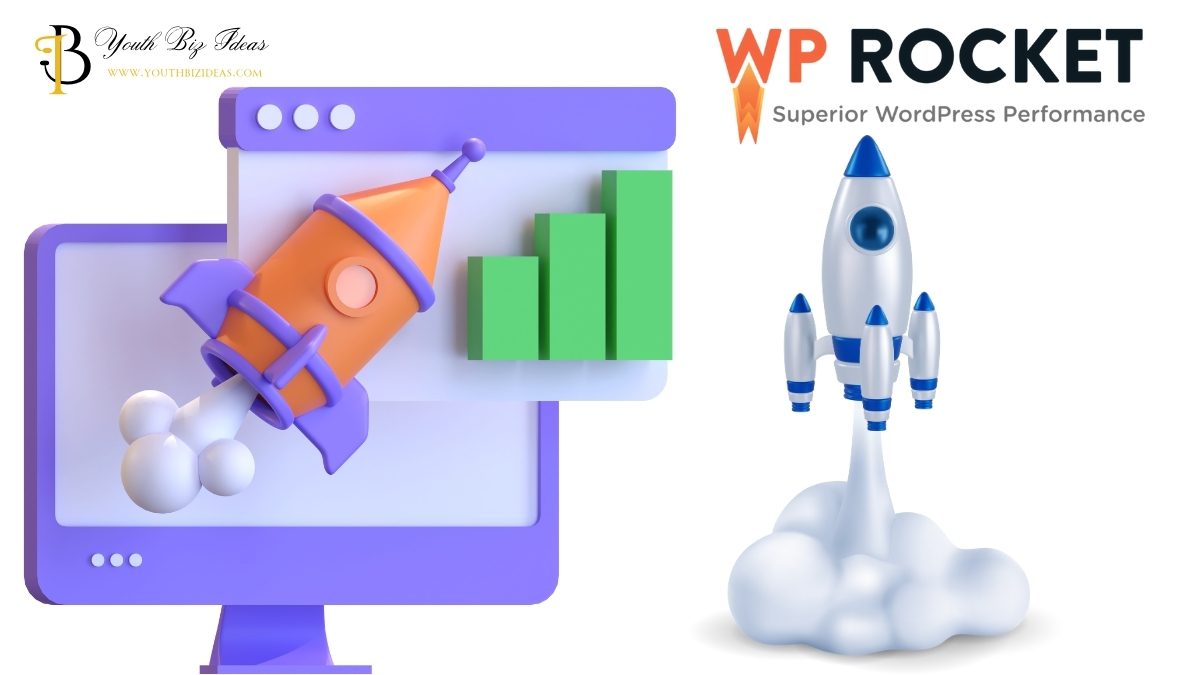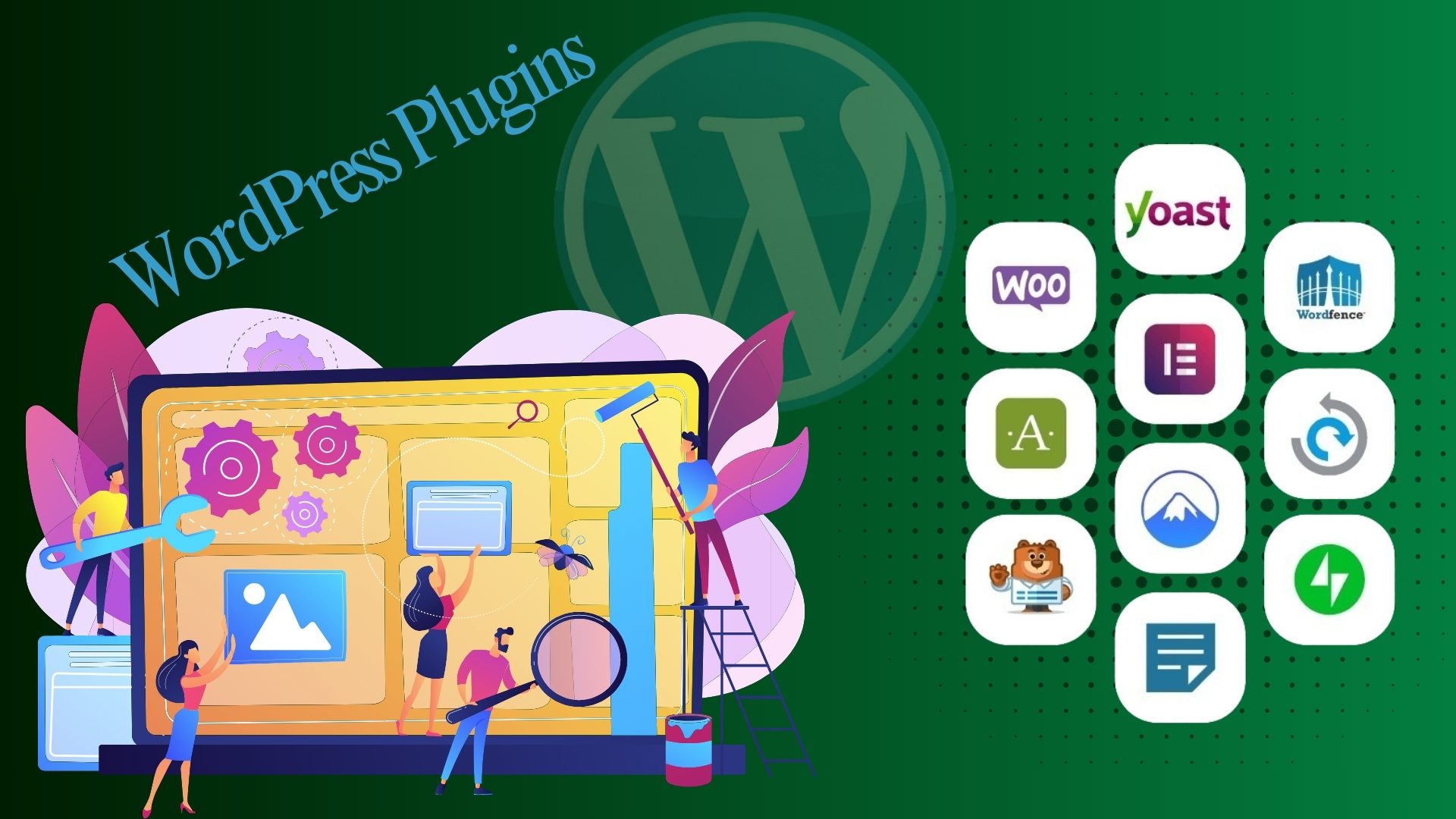Introduction & Key Factors in Choosing Plugins for WordPress
Comprehending Plugins for WordPress
WordPress Plugins enhance the functionality of your WordPress website. They might link online commerce platforms, improve search visibility, or provide contact forms. These plugins, like WooCommerce, which simplifies features like payment gateways, are revolutionary technologies that offer more than ease. WordPress powers over 40% of websites globally because of its user-friendliness, making it a vital tool for website owners.
Overview of Plugin Types
Many plugins are arranged according to their specific purpose, including e-commerce plugins like WooCommerce for managing online stores, form plugins like Gravity Forms for creating expert forms, utility plugins like WP Rocket for caching and Yoast SEO for improving search visibility, and design plugins like Elementor or Jet for aesthetic appeal and user interaction. These categories are crucial to WordPress plugins since they meet user needs and carry out specific tasks.
Plugins’ Importance in Website Development
Plugins are essential for website creation because they make the process easier and enable people without technical knowledge to build robust websites. With its user-friendly drag-and-drop interface, Elementor simplifies the website creation process, saving users time and money. Because technology has become more accessible, plugins like WordPress are now necessary for modern web creation, making creating stunning websites easier.
The Value of WordPress Plugins
Plugins are essential to WordPress because they increase functionality, simplify procedures, encourage scalability, and spur innovation. They improve the site’s efficiency and attractiveness by adding depth, color, and texture. Tools like Monster Insights and WPML concentrate on caching, backup, and speed optimization while offering improved analytics and support for multilingual websites.
The ever-evolving WordPress ecosystem ensures that users always have access to the newest resources. WordPress would be a blank canvas without plugins.
Crucial Things to Look for When Choosing WordPress Plugins
Interoperability with Various WordPress Versions
Choosing one is crucial because WordPress Plugins differ in quality and cannot get regular updates. It would be like trying to run modern software on an antiquated machine. Verify that the plugin is compatible with your current version, and watch for upgrades. Plugins that aren’t working correctly might take down your website.
Security and Regular Updates
Selecting WordPress Plugins that are kept up to date is crucial for protecting against possible hackers. Positive comments and regular updates are essential. While standard plugins need strict security measures to ensure the safety of data and visitors, plugins like Wordfence and Sucuri are designed to strengthen websites. Don’t use plugins that aren’t appropriately updated and expose your site.
Impact on Website Performance and Speed
Website performance and speed are crucial factors to consider when using WordPress Plugins. WP Rocket is a potent optimization and caching plugin that dramatically improves your website’s loading performance. However, specific plugins may be hefty, and the website’s speed may suffer if too many excessive or poorly designed ones are included. It’s critical to monitor the site’s speed before and after installation.
User Comments and Ratings
User reviews and ratings are crucial when choosing WordPress Plugins. They provide essential details on a plugin’s reliability, usability, and caliber of assistance. Be mindful of the details and avoid plugins with just two reviews. Look for plugins with a high average rating and hundreds or thousands of reviews. Analyze positive and negative evaluations to learn about reoccurring issues or potential benefits.


Best Plugins for WordPress
The Most Popular Plugins for Various Needs
WordPress Plugins serve as vital resources for web development, addressing common challenges, improving functionality, and elevating the user experience. WooCommerce, Yoast SEO, WordPress Rocket, Elementor, and Gravity Forms are widely used. WooCommerce is perfect for creating online stores, and Yoast SEO makes on-page optimization easy. WordPress Rocket enhances caching, reduces CSS and JavaScript, and boosts page loading speeds.
Elementor is a widely used design platform that enables users to customize their designs through an intuitive drag-and-drop interface, eliminating the need for coding skills. Gravity Forms is the premier tool for creating forms to gather data, manage surveys, facilitate contact forms, and process applications. Their widespread appeal reflects their dependability and effectiveness.
Comparing Free vs. Paid Plugins
Deciding whether to use free or paid WordPress plugins hinges on the specific requirements of your website. Free options provide essential functionality, yet they might come with restrictions such as fewer features, limited support, or advertisements. High-quality plugins, in contrast, offer enhanced functionalities, top-tier support, and consistent updates. Examples are Yoast SEO, providing content insights, suggestions for internal linking, and management of redirects.
Paid plugins can enhance efficiency and facilitate seamless website functionality, particularly for more extensive projects. Plugins are essential tools that enhance your site’s potential and contribute to its long-term success.
Identifying Niche-Specific Plugins
Finding plugins specific to your niche is essential for WordPress to address the needs of distinct industries or applications. Some examples are Essential Real Estate plugins, LearnDash, Tutor LMS, Envira Gallery, and NextGEN Gallery. These plugins provide functionalities such as property listings, virtual tours, mortgage calculators, course creation, quizzes, and student management, guaranteeing a customized experience for your audience.
Essential WordPress Plugins
Elementor: Redefining Website Design
Features That Make Elementor Stand Out
Elementor is a widely used website builder with a drag-and-drop editor, various pre-built templates, responsive design capabilities, more than 90 widgets, and a comprehensive theme builder. Users can effortlessly arrange elements without coding, craft beautiful designs for desktops, tablets, and smartphones, and personalize headers, footers, and dynamic content. Elementor stands out as a leading option for WordPress plugins, making design easier while providing extensive features.
Pros and Cons of Elementor
No tool is flawless, and Elementor is undoubtedly no different. Let’s consider the positives and the negatives:
- Advantages:
An intuitive interface that is simple for beginners to navigate.
A diverse collection of templates and widgets.
Effortless compatibility with various WordPress plugins, including WooCommerce and Jet Plugins.
- Cons:
It may cause your site to experience slower performance if not optimized correctly.
Certain advanced features are only accessible in the Pro version.
There can be occasional compatibility issues with specific themes or plugins.
Elementor is a fantastic tool, but as with any plugin, it’s essential to utilize it thoughtfully.
When to Choose Elementor for Your Site
Elementor stands out as a widely used WordPress plugin. It provides meticulous control for those who seek perfection, an easy-to-navigate interface for newcomers, and ready-made templates for individuals pressed for time. This option enables simple adjustments to design elements, making it perfect for anyone wanting a fast, polished website without a complicated learning process.
Beaver Builder vs. Elementor
How does Elementor compare to its nearest competitor, Beaver Builder? It’s akin to comparing two top-tier vehicles—each is outstanding but appeals to distinct groups of enthusiasts.
- Elementor:
Provides a complimentary version packed with powerful features.
Ideal for those seeking creative freedom and a wide range of customization options.
It is ideal for both newcomers and experienced users.
- Beaver Builder:
It is designed to be lightweight, minimizing the chances of affecting site speed.
It is recognized for its outstanding stability and reduced compatibility problems.
This is perfect for developers who value straightforwardness rather than extravagant functionalities.
The final decision hinges on what matters most to you. If you seek abundant design possibilities and are willing to navigate a more challenging learning process, Elementor is the top choice among WordPress plugins. If your primary focus is on stability and speed, Beaver Builder could be the superior choice.


Woocommerce: Revolutionizing Online Stores
Why Woocommerce is the Go-To for E-commerce
Regarding e-commerce plugins, WooCommerce is the preferred choice since it turns WordPress websites into dynamic online stores without requiring bespoke development. Businesses of all sizes may benefit significantly from its high degree of customization, ease of use, and free use. Premium add-ons are available for more sophisticated functionality. The most popular e-commerce plugin is WooCommerce, which powers millions of online shops globally.
Features That Drive Online Sales
WooCommerce is a robust e-commerce platform that provides a distinctive shopping experience. It allows for mobile optimization, integrated analytics, a smooth checkout, and simple product administration. Additionally, it makes it simple to upload, classify, and customize items, providing a safe and straightforward checkout experience. By offering valuable data on inventory, revenue, and consumer behavior, WooCommerce’s integrated solutions enable companies to prosper in cutthroat marketplaces.
Extensions That Supercharge WooCommerce
WooCommerce’s real strength is its plugins, which provide sophisticated capabilities for specific purposes. Some include WooCommerce Bookings, which lets clients make direct appointments or reservations; WooCommerce Subscriptions, which allows companies to offer recurring payments; and WooCommerce Shipping, which makes shipping easier with carrier connections and real-time prices.
Payment Gateway Plugins
Square for online and offline companies, PayPal for safe payments, and Stripe for easy credit card acceptance are just a few of the payment gateway plugins that WooCommerce provides. These plugins increase client happiness and encourage repeat business by ensuring a quick, secure, and easy checkout experience.
Streamlining Product Management
WooCommerce’s user-friendly features, such as bulk editing, inventory monitoring, and customized product pages, make product administration easier. To keep consumers happy, these tools let users check stock levels, alter pricing or stock levels for various items, and establish alerts for low inventory. Product administration is elevated to an art form by WooCommerce.
Gravity Forms: Simplifying Data Collection
How Gravity Forms Enhances Website Functionality
A plugin called Gravity Forms manages data-collecting requirements to improve website operation. Its smooth integration with WordPress plugins makes gathering information for event registration, job application processing, and customer feedback simple. Because Gravity Forms integrates seamlessly with third-party technologies like HubSpot, PayPal, and Mailchimp, it is an essential feature of websites.
Best Practices for Form Design Using Gravity Forms
The following recommended practices might help you maximize Gravity Forms form design: It should be brief, include validation to guarantee that the correct information is submitted, employ conditional logic to reveal or conceal fields depending on user replies, and be mobile-friendly. Using these techniques, you may gather the correct data more effectively and provide a more customized customer experience. Adhering to these rules may optimize your Gravity Forms results.
Real-World Use Cases for Gravity Forms
Customer reviews, event registrations, lead generating, and contribution forms are just a few practical applications for Gravity Forms. Create surveys, get RSVPs, qualify leads, and integrate payments, among other things. Because of its many uses, it is an essential plugin for WordPress users.
Comparison with Contact Form 7
Although Gravity Forms and Contact Form 7 often compete, their functions are distinct:
- Gravity Structures:
PlA plugin that costs money and has sophisticated functionality like file uploads, conditional logic, and integrations.
Professional data gathering and complicated forms are the best options.
Comes with first-rate assistance.
- Contact Form 7:
An open-source plugin for simple forms.
Modest web pages work well despite lacking sophisticated features.
It depends on third-party add-ons to provide more features.
You may use Contact Form 7 if you require basic forms. But among WordPress plugins, Gravity Forms is the undisputed leader for companies trying to maximize data capture and expand.


WP Rocket: Boosting Speed and Performance
Why Speed Matters: The WP Rocket Advantage
Today’s digital world demands speed, and a website that takes more than three seconds to load may lose visitors. WP Rocket is a performance enhancer that measures a website’s load speed, retaining visitors and impressing search engines. In addition to helping users, a speedier website affects SEO rankings and conversion rates, making it an effective tool for WordPress plugins.
The Role of WP Rocket in Site Optimization
WP Rocket optimizes your website in more ways than one, not simply by using caching. It does its magic like this:
- Page caching: Produces static HTML files of your website so that returning users may access it more quickly.
- GZIP compression speeds up load times by reducing the size of files delivered from your server to browsers.
- Browser Caching: Keeps resources locally on users’ devices to load immediately when they return to a website.
- Minification reduces the weight of HTML, CSS, and JavaScript files by removing extraneous characters.
Thanks to WP Rocket, even non-techies may enhance their website’s speed with a few clicks. It takes care of these chores automatically.
Key Features of WP Rocket
In comparison to other WordPress plugins, what distinguishes WP Rocket? Let’s examine some of its best qualities:
- Lazy loading improves performance and conserves bandwidth by delaying loading pictures and videos until they are displayed on the screen.
- Database optimization streamlines your database by removing out-of-date data, deleted comments, and obsolete drafts.
- Content delivery network (CDN) compatibility allows for lightning-fast worldwide access.
- E-commerce optimization: Prevents cache problems for dynamic sites like the checkout and cart by guaranteeing compatibility with WooCommerce.
Because it makes complex optimization work easier, WP Rocket is an excellent option for both novices and specialists.
Alternatives to WP Rocket: Are They Worth It?
Although it is a strong tool, WP Rocket is not the only choice. While they provide strong capabilities for free, alternatives like W3 Total Cache, LiteSpeed Cache, and WP Super Cache have more difficult learning curves and fewer automated possibilities. WP Rocket’s dependability and simplicity of use often make up for the possible cost reductions from these substitutes.
Lazy Loading and Its Role in Optimization
You may think of lazy loading as allowing your website to breathe. With this technique, only pictures and videos are loaded as they show on the screen rather than all at once. Load times are significantly reduced with this technique, particularly for websites with a lot of material. With WP Rocket, installing lazy loading is simple, and your website will have the speed of a sprinter instead of a heavyweight.
Image Compression Plugins Compared
If properly optimized, compared images might be the most time-consuming elements on your website. WP Rocket is compatible with image-compressing plugins like ShortPixel, Imagify, and Smush.
- Smush: Free with premium features, perfect for novices.
- Imagify: A WebP conversion and lossless compression companion plugin for WordPress Rocket.
Images may be compressed using ShortPixel without sacrificing quality, and it has excellent bulk optimization capabilities.
By reducing the load, these plugins ensure images don’t harm your site’s performance.
Database Cleanup Made Easy
Over time, your WordPress database becomes cluttered with modifications, spam comments, and temporary data. Imagine it as a disorganized garage that needs to be cleaned up. The database cleaning tool from WP Rocket acts as a vacuum cleaner for your database, removing unneeded clutter to maintain your website’s functionality. A slight change has a significant impact on performance.


SEO Plugins: Enhancing Search Visibility
Overview of the Best SEO Plugins for WordPress
Concerning Plugins, SEO plugins for WordPress are crucial for any website aiming to improve its search engine rankings. Among the top options are:
- Yoast SEO is ideal for newcomers and experienced users, offering an intuitive interface and a wide range of features.
- Rank Math is a rising competitor that provides advanced features and rich snippets.
- Comprehensive SEO Solution: An established plugin recognized for its ease of use and firm performance.
These plugins offer unique advantages, serving various user preferences and SEO requirements.
Features of Yoast SEO
Yoast SEO has established itself as one of the top SEO plugins for WordPress. This is what sets it apart:
- Readability Analysis: Makes your content easy to read, enhancing engagement.
- Concentration Keyword Optimization: Assists you in enhancing your strategy for your selected keyword.
- Breadcrumbs: Introduces navigation tools that improve user experience and site organization.
Yoast SEO provides a straightforward method that simplifies optimizing your site.
Features of Rank Math
Rank Math resembles the younger, more tech-savvy relative of Yoast SEO. Here’s why it’s becoming more popular:
- SeveHere’shanceit’s a maximum of five keywords in the complimentary version.
- Schema Markup enhances the visibility of your content through rich snippets.
- Connecting with Google Analytics: Access traffic insights directly from your WordPress dashboard.
Rank Math is perfect for those seeking advanced features without any additional expenses.
All-in-One SEO: A Comprehensive Review
All-in-One SEO has long been a trusted plugin. The strengths are as follows:
- Setup Wizard: This makes the configuration process straightforward for beginners.
- XML Sitemaps: Automatically generates and refreshes sitemaps to enhance indexing.
- Social Media Integration: Enhances content sharing across platforms like Facebook and Twitter.
Although it may not have the same flair as recent alternatives, All-in-One SEO remains dependable.
Keyword Research Tools in Plugins
SEO plugins typically come with keyword research tools that assist in pinpointing practical terms. Plugins such as Rank Math and Yoast offer recommendations based on search volume, competition, and relevance, helping to ensure your content reaches the appropriate audience.
Yoast vs. Rank Math: A Comparative Analysis
Choosing between Yoast and Rank Math feels like picking between a reliable old companion and an exciting new ally.
- Yoast SEO:
A reliable choice with an easy-to-use interface for newcomers.
While the free features are somewhat limited, the reliability is impressive.
- Rank Math:
Loaded with features, even in the free edition.
Experienced users should feel at ease with additional settings.
Your decision relies on how well you understand SEO and your requirements.
How SEO Plugins Help Boost Organic Traffic
SEO plugins serve as guides, helping search engines navigate your site. Enhancing metadata, developing XML sitemaps, and recommending on-page improvements increase your site’s visibility and attractiveness to seaside signs, boosting organic traffic.
SEO Tips for Beginners
Are you just beginning? Here are a few quick tips:
- Concentrate on a single keyword for each page.
- Create compelling meta descriptions that drive clicks and capture attention.
- Connect your content by using internal links.
- Consistently refresh your website’s content to keep it current.


Jet Plugins: Multipurpose Add-ons for Professionals
What Makes Jet Plugins Unique?
Jet Plugins is an exceptional toolkit designed for WordPress enthusiasts, providing versatility and customization options. Created mainly for Elementor, it serves those who seek precision and beauty. Jet Plugins’ modular design enables users to select from various plugins specifically crafted to address their unique requirements, empowering them to build engaging blogs or stunning portfolios.
This collection accommodates everything from minor adjustments to intricate designs, empowering users to enhance their creativity and produce high-quality websites.
Integration with Elementor and Other Builders
Jet Plugins boost Elementor’s functionality by providing advanced widgets, pre-designed headers, footers, and page templates. They also enable the creation of stylish tabs and accordions to enhance content organization. Jet Plugins seamlessly integrate with various page builders, including WPBakery, offering versatility for any workflow, whether you’re utilizing Elementor or not.
Adding Dynamic Content with JetEngine
JetEngine is a robust solution for generating dynamic content on websites. Users can create custom post types, taxonomies, and fields without writing any code. JetEngine supports data-rich content and updates automatically, working seamlessly with Elementor to create visually stunning layouts that integrate dynamic content.
Creating Grids with JetGridBuilder
JetGridBuilder is a plugin that enables users to design customizable grids for different uses, including displaying a photo gallery, product catalog, or portfolio. It includes drag-and-drop controls and responsive design options, making grid creation functional and enjoyable, enabling users to craft a stunning visual mosaic.
Tips for Maximizing Jet Plugins’ Potential
For optimal use of Jet Plugins, integrate them with JetEngine and JetSmartFilters to enhance user search capabilities. Try out different widgets in JetElements to discover the most effective message. Use ready-made templates from JetThemeCore to conserve your time. Frequent updates from developers guarantee compatibility and enhanced features. Jet Plugins serve as the brushstrokes that bring a masterpiece to life.
Unlocking Creativity with Custom Widgets
Jet Plugins allow you to design custom widgets that meet your specific requirements. Are you looking for a slider with a distinct behavior or a testimonial block with a unique touch? Using JetPlugins, you have the power to create it. It’s akin to locking a treasure trove of opportunities for your website, guaranteeing that you differentiate yourself from generic designs.
Security Plugins for WordPress
Common Security Threats
Hackers resemble contemporary pirates in the online realm, constantly on the lookout for valuable loot on unsecured websites. Some typical threats are:
- Brute force attacks involve making multiple login attempts to guess passwords.
- Malware Injection: Code that undermines your site’s performance and security.
- SQL Injections involve taking advantage of weaknesses in database systems to obtain unauthorized access.
- Cross-site scripting (XSS) involves injecting harmful scripts to steal user information.
Identifying these threats is the initial move in strengthening your WordPress site.
Best Practices for Plugin Security
To maintain plugin security, ensure your website is up to date, restrict plugin usage to only what is necessary, install plugins from reliable sources, and utilize strong passwords. These practices foster a safe environment while maintaining simplicity, enabling you to ensure your site remains user-friendly and safeguarded against possible security threats.
Top Plugins to Secure Your Website
For strengthening your site, these WordPress plugins stand out as the best options:
- Wordfence Security provides a firewall, malware scanner, and real-time threat defense.
- Sucuri Security specializes in monitoring and safeguarding against malware and DDoS attacks.
- iThemes Security enhances user credentials, mandates robust passwords, and prevents suspicious activities.
- All-In-One WP Security and Firewall: A plugin that is easy for beginners and offers advanced features.
Every plugin offers distinct advantages, enabling you to select one that fits your requirements.
Backups: Your Digital Insurance Policy
Picture the horror of suddenly losing all the content on your website—it’s a nightmare. Backups serve as your safety net. Tools such as UpdraftPlus, BackupBuddy, and Jetpack Backup allow for quick restoration of your site in case of a breach or unintentional data loss.
Backups are similar to keeping a spare key for your home. Even if locked out, you can get back in without hassle. Set up consistent backups and keep them in various places, such as the cloud and external drives, to ensure complete peace of mind.


Free vs. Premium Plugins: A Detailed Comparison
Features to Expect from Free Plugins
Free plugins in the WordPress ecosystem provide essential elements like contact forms, SEO improvements, and caching; nevertheless, they may not have sophisticated features or individualized assistance. They may provide priority troubleshooting, scalability, or customization, making them perfect for novices or those on a limited budget. Restrictions: free plugins could be all you need for tiny websites or essential activities.
Are Premium Plugins Worth the Investment?
Like luxury automobiles, premium plugins provide superior performance, cutting-edge features, and committed customer support. However, the usefulness of these plugins varies according to your website. Professionals looking for excellence may find long-term benefits from investing in premium plugins like WooCommerce Extensions or WP Rocket for e-commerce administration, extensive customization, or strong security.
Popular Free Plugins You Should Know
Free plugins like this demonstrate their value every day, even while expensive ones provide grandeur:
- Yoast SEO is an easy-to-use tool for search engine optimization.
- Elementor: For simple page-building tasks, the free edition is ideal.
- WooCommerce: The basic plugin is free and robust, but extensions are more expensive.
- UpdraftPlus: A dependable choice for website backup.
These well-regarded plugins show that you don’t always need to spend a lot of money to improve your website’s functionality.
Making the Right Choice for Your Needs
Your budget, needs, and customer service will all influence your decision between free and paid plugins. While commercial plugins are appropriate for corporate websites or large-scale projects, free plugins are best suited for tiny blogs.
Challenges in Using WordPress Plugins
- Managing Plugin Overload: Controlling plugin overload is essential to your efficiency. It may result in slower load times, incompatibilities, and security flaws. Regular audits may facilitate managing plugin overload, enabling you to determine which plugins are essential and eliminate those that aren’t.
- Balancing Functionality and Site Speed: It’s critical to balance site performance and usefulness. Plugin additions may result in loading more scripts, slowing down a website. While multifunctional plugins like JetPlugins combine capabilities to lessen website pressure, lightweight plugins like WP Rocket manage caching and optimization.
- Tackling Security Vulnerabilities: It’s crucial to utilize trustworthy plugins, keep them updated, and employ robust security solutions like Wordfence to fortify your website against security flaws and guarantee its safety from hackers.
- Overcoming Compatibility Issues: Plugins that clash with your theme, WordPress version, or other plugins may cause compatibility problems. To prevent these hassles, use staging environments to test new plugins without impacting your live site, and make sure they are compatible before installing them. It’s like trying on new clothing before deciding to buy it.
- Managing Updates Efficiently: It may be difficult to manage plugin updates effectively, mainly when using many plugins. To make things easier, enable automatic updates for less important plugins, and after testing, manually update the key ones. In the event of problems, a backup strategy such as Updraft Plus guarantees site restoration. A seamless experience requires regular plugin upgrades, which cannot be compromised.
Conclusion
Plugins for WordPress are crucial tools that turn a website into a potent platform for functionality, design, and performance. Among the many uses for these technologies are professional portfolio development, online business launching, and blogging.
Numerous plugins, such as WP Rocket, WooCommerce, Gravity Forms, and SEO tools like Yoast and Rank Math, each have advantages and contribute to a thriving ecosystem.
It is essential to utilize plugins carefully to guarantee a seamless user experience and a future-proof website. Regardless of experience, the correct plugins may solve issues, foster creativity, and bring ideas to life.
It’s critical to experiment with plugins, explore choices, and have an open mind. With the correct tools and creativity, your website may become a masterpiece. Deep dive into WordPress plugins and produce a remarkable digital work of art.
FAQs
- What is the best plugin for WordPress?
The best plugin depends on your needs. Elementor is ideal for design, while WooCommerce is perfect for e-commerce. WP Rocket is a must for speed enthusiasts.
- Are WordPress plugins free?
Many plugins are free, but premium versions offer advanced features and dedicated support.
- How do I add plugins in WordPress?
Navigate to your WordPress dashboard, click “Plugins,” then “Add New.” Please search for your desired plugin, install it, and activate it.
- What is the most-sold WordPress plugin?
WooCommerce tops the charts as one of the most widely used and sold plugins for online stores.
- What is the best WordPress form plugin?
Gravity Forms stands out for its flexibility and advanced features, making it a favorite among developers.









